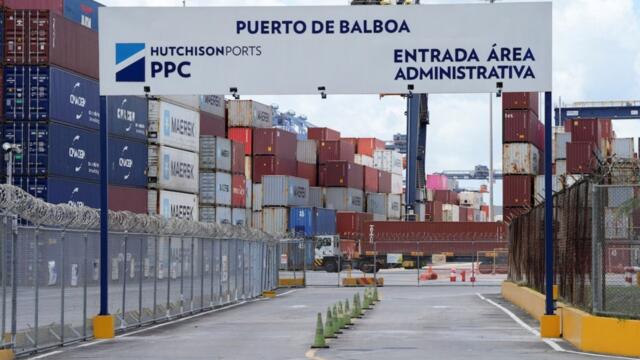- Blogs
- Now Panama!
Now Panama!

Wajeeh Ullah
“China is on both sides of the canal. China is controlling the canal”.
The statement is neither an egregious remark by any US Think Tank professor nor a statement by a regional foe. US President Trump made the remarks after he was re-elected as POTUS. President Trump is famous for creating such odd, undiplomatic remarks. Still, the statement is not merely an outcry but a clear understanding of the region's geopolitics. He was talking about the Panama Canal region and its geostrategic positioning. The geopolitical outplay in the Panama Canal area is worsening every day.
The Panama Canal is an 81 km long artificial waterway created by American engineers in 1914. It was considered an engineering marvel before the building of the Suez Canal. The canal is between the Pacific and the Atlantic oceans, with the Caribbean Sea crossing in the middle. The Panama Canal has three lock gates where the water level is artificially controlled. It usually takes 8-10 hours for a vessel to cross the canal. The canal holds a 4% share in the International maritime trade, and almost 40% of US Cargo ships pass through the canal regularly.
The canal has enormous economic and strategic importance. It was not until 1999 that the canal was finally handed over to the Pennames government. The Panamanian government now controls the port area, supervised by the Panama Canal Authority (PCA). In contrast, the cargo terminal on each side of the canal has been outsourced to a conglomerate called CK Hutchison. This port and shipping giant controls the shipping terminals of Balboa on the Pacific side and Cristobal on the Atlantic side. CK Hutchison is a Hong Kong-based company that controls 43 of the busiest ports and cargo terminals in 23 countries. They are a multi-billion-dollar conglomerate heavily investing in the ports, shipping, and energy sectors.CK Hutchinson runs its business by distributing assets to various other subsidiary companies, including the Panama Port Company (PPC), which oversees the functioning of the Balboa and Cristobal port terminals.
Mainland China possesses a strong Authoritarian control over Hong Kong. It is a special administrative unit of China, governed under the "one country, two systems principle". In 2020, China implemented the draconian National Security Law in the name of National security. The law prohibits anyone from expressing trivial dissent from mainland China. Anyone who does that will be treated as a separatist or secessionist. These laws apply to everyone, even the multi-billion-dollar owner of CK Hutchinson, Le Ka-shing. 12% of his business empire is based mainly in Hong Kong. According to The Economist, Le Ka-Shing first had good ties with the party in China, but soon he moved his capital to the outside world, making him an alien to the Chinese top brass and their view of preserving national interest.
The situation escalated when CKH decided to sell its multi-billion-dollar conglomerate in March. The highest bids came from Black Rock Investment (USA) and MSC (Italy and Switzerland). The former is a renowned investment venture capitalist, while the latter is an Italian business tycoon. The deal was finalised for $ 22.8 billion for the 43 ports running in 23 different countries, which includes the two port terminal sides in the Panama Canal area. The deal got finalised in March this year. As the news spread, Chinese authorities started threatening the Hong Kong-based conglomerate by announcing they had initiated regulatory anti-monopoly probes into the business. These were seen as retributory measures. Later, CKH included Chinese shipping giant COSCO (China Ocean Shipping Company) in the deal, ignoring Chinese demands for a veto share. It means that out of CKH’s 90% share in the Panama Canal port company, China wants a lion's share that gives it the autonomy to make policy-level decisions without consulting other partners. The sharing formula is yet to be decided, as many market Pundits say it could take 2 years to complete the conglomerate t.
The deal has gained huge media attention for its vastness. But the flashpoint that made it to the papers was resentful messages sent from Beijing to the tycoon. The big boss in Beijing was not so happy with the takeover of an American firm. Alongside that, the Panama Supreme Court ruled this venture nullified and unconstitutional. We have not yet confirmed whether the Panamanian Supreme Court has any say in the transfer matters.
Simply put, this is not just a multi-billion-dollar transfer but a geopolitical power struggle. The buyers have the complete backing of their governments, and they are proving to be trade nukes. Moreover, China will use the inclusion of COSCO (in the deal) as leverage in the trade talks between the two superpowers currently taking place in Sweden.
Disclaimer: The views expressed in this article are solely those of the author and do not necessarily reflect the official stance of The Himalayan Research Institute Pakistan - (THRIP)
_________________________________
Wajeeh Ullah is a student of BS Political Science at Government College University Lahore.
Contact us

Write with Us
The Himalayan Research Institute is proud to introduce "Himalayan," a dynamic and insightful magazin...
- [email protected]
- +923426470466
- website
